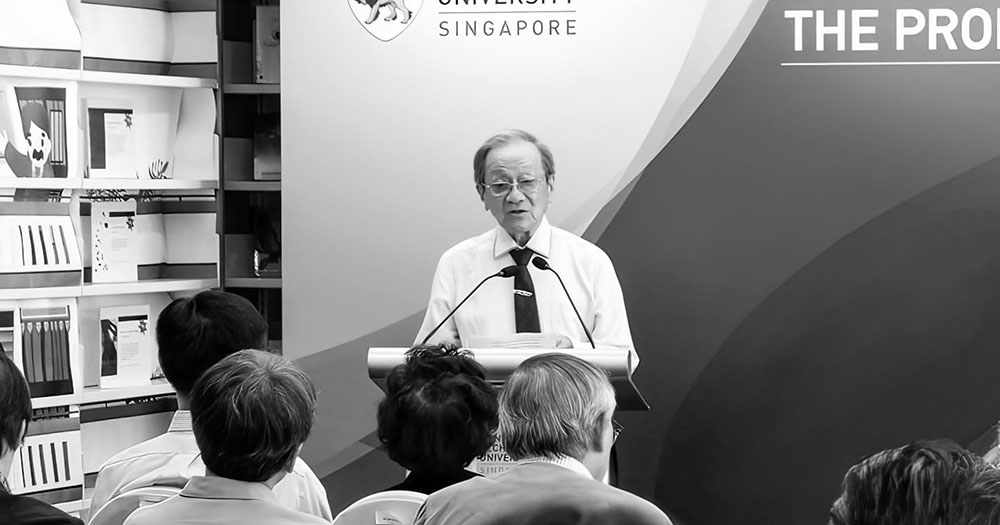Prime Minister Lee Hsien Loong paid tribute to the late Singapore economist Lim Chong Yah, who passed away the age of 91.
In a letter addressed to his widow, See Nah Nah, PM Lee expressed his condolences and recalled how Lim had known him for many years, since he was a young man.
Tutored by Lim for A level economics
The Prime Minister added that he had been tutored by Lim for a year in 1970, in the subject of economics.
PM Lee said he had been studying the subject for his A-level examinations, and described Lim as a "patient and caring" teacher, and that "many generations of students" would attest to that.
PM Lee recalled how Lim would set him an essay topic each week for him to write and research about before discussing it at the next tutorial.
"It was an active, intense and effective way to master the basics of the subject, which have remained with me and proven invaluable all my life," he said.
PM Lee added that they had kept in touch since then.
Made major contributions as Chairman of the National Wages Council
Following his entry into politics, PM Lee added that the two men had more reason to engage, as he was in the Ministry of Trade and Industry (MTI) while Lim was Chairman of the National Wages Council (NWC).
According to the prime minister, Lim had become the founding Chairman in 1972, when the government set up the NWC to guide wage negotiations nationally.
Lim served in the role for almost 30 years until 2001.
Calling his contributions during this period "critical", PM Lee wrote:
"The NWC’s annual negotiations and recommendations paved the way for smooth industrial relations and progressive wage adjustments. The process helped maintain industrial peace, ensured workers enjoyed a fair share of the fruits of growth, and strengthened the tripartite partnership between unions, employers, and government.
Under Prof Lim’s stewardship, the NWC grew into a crucial institution unique to Singapore and trusted by all parties, that continues to serve us well till this day."
The prime minister further recalled NWC negotiations in 1986 in the wake of Singapore's worst economic downturn since independence, and amidst uncertainty over whether the economy was recovering.
During this time, PM Lee was Acting Minister in MTI and was also the chairman of the Economic Committee.
He added that the committee had recommended cutting the CPF contribution rate from 50 per cent to 35 per cent, and maintaining "severe" wage restraint to cut business costs and restore Singapore’s competitiveness vis-à-vis competitors such as South Korea, Taiwan and Hong Kong.
PM Lee recalled that the recommendations were "drastic" and said that it was crucial that both employers and unions understood the national imperative, and the strategy was not derailed by "over-generous and unrealistic" wage settlements.
During this time, MTI worked with Lim during the NWC negotiations, he added.
Lim helped to ensure the government's overriding considerations were accurately translated into "clear, workable and fair" recommendations, which resulted in the economy reviving faster than the government had "dared to expect", he said.
NWC also paid attention to lower-wage workers
The prime minister further highlighted that as the economy developed and the NWC matured, the council began expanding its focus beyond wage settlements to other areas.
"It promoted flexible wages, which helped employers to better manage wage costs and provided employees greater job security during challenging times. It paid attention to lower-wage workers, crafting recommendations to make sure they received meaningful wage increases and were not left behind as wages generally went up."
PM Lee further highlighted that as early as 1979, the NWC was also involved in setting up the Skills Development Fund (SDF), to encourage workers to upgrade their skills as Singapore transitioned from a labour-intensive economy to a skills-intensive one.
He wrote:
"Decades later, our journey continues, as we expand continuing education and lifelong learning to encompass the entire population. We continue to benefit from the principles and foundations that Prof Lim established."
Will be "deeply missed"
PM Lee added that for his "outstanding" contributions to Singapore's national and economic development, he was conferred the Public Service Star in 1976, the Meritorious Service Medal in 1983 and the Distinguished Service Order in 2000.
The prime minister concluded:
"Professor Lim will be deeply missed. I hope you will find comfort in knowing that his memory and legacy will live on through his many lasting contributions to Singapore and their impact on generations of Singaporeans.
Ho Ching and and I extend our deepest sympathies to you and your family in this time of loss and grief."
Top photo via NTU Facebook
If you like what you read, follow us on Facebook, Instagram, Twitter and Telegram to get the latest updates.



